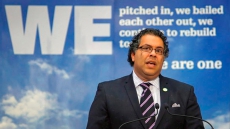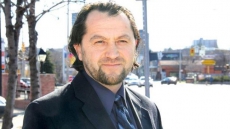TORONTO — Former U.S. intelligence contractor turned whistleblower Edward Snowden says citizens of the world, including Canadians, should be "extraordinarily cautious" when their governments try to pass new laws under the guise of an increased threat of terrorism.
Legislation tabled last Friday would give the Canadian Security Intelligence Service powers to actively disrupt threats, not just collect information about them.
Snowden, who remains in Russia after leaking U.S. National Security Agency documents, says citizens of any country should have concerns about this type of legislation.
"I would say we should always be extraordinarily cautious when we see governments trying to set up a new secret police within their own countries," Snowden said Monday night during a video conference organized by Upper Canada College in Toronto.
Intelligence powers used by governments in ways related to political ideologies, radicalization, influence of governments and how people develop their politics are cause for concern, the former NSA analyst added.
"We need to be very careful about this because this is a process that is very, very easy to begin. It always happens in time of fear and panic — emergency legislation — they say we're facing extraordinary threats and again if you look at the statistics while the threats are there, they're typically not as significant as presented."
"Once we let these powers get rolling its very difficult to stop that pull though," Snowden said. "So I would say that we need to use extraordinary scrutiny in every society, in every country, in every city, in every state to make sure that the laws we live under are the ones we truly want and truly need."
Public Safety Minister Steven Blaney has said he believes that the Security Intelligence Review Committee — which reports to Parliament — has the expertise to keep an eye on CSIS.
Glenn Greenwald, who received documents from Snowden and reported about them for The Guardian newspaper, told the conference that Canadians have a greater chance of dying from being struck by lightning or slipping in a bathtub than from a terrorist attack.
Snowden and Greenwald shared their knowledge of privacy rights with more than 900 high school students at the conference and hundreds of others via a livestream.
Greenwald called the threat of terrorism in Canada "infinitesimal," and accused the Canadian government of "fearmongering," saying it's a very dangerous yet effective way of persuading people to accept things to which they wouldn't normally submit.
"Your government continuously hypes the threat and tells you that unless you give it more and more power it will be incapable of saving you from this threat," Greenwald said.
The terror legislation would also make it easier for police to control the movements of terror suspects and to detain them longer without warrant.
Opposition MPs and civil liberties advocates have expressed concern that the bill doesn't boost oversight of Canada's spy agency.





